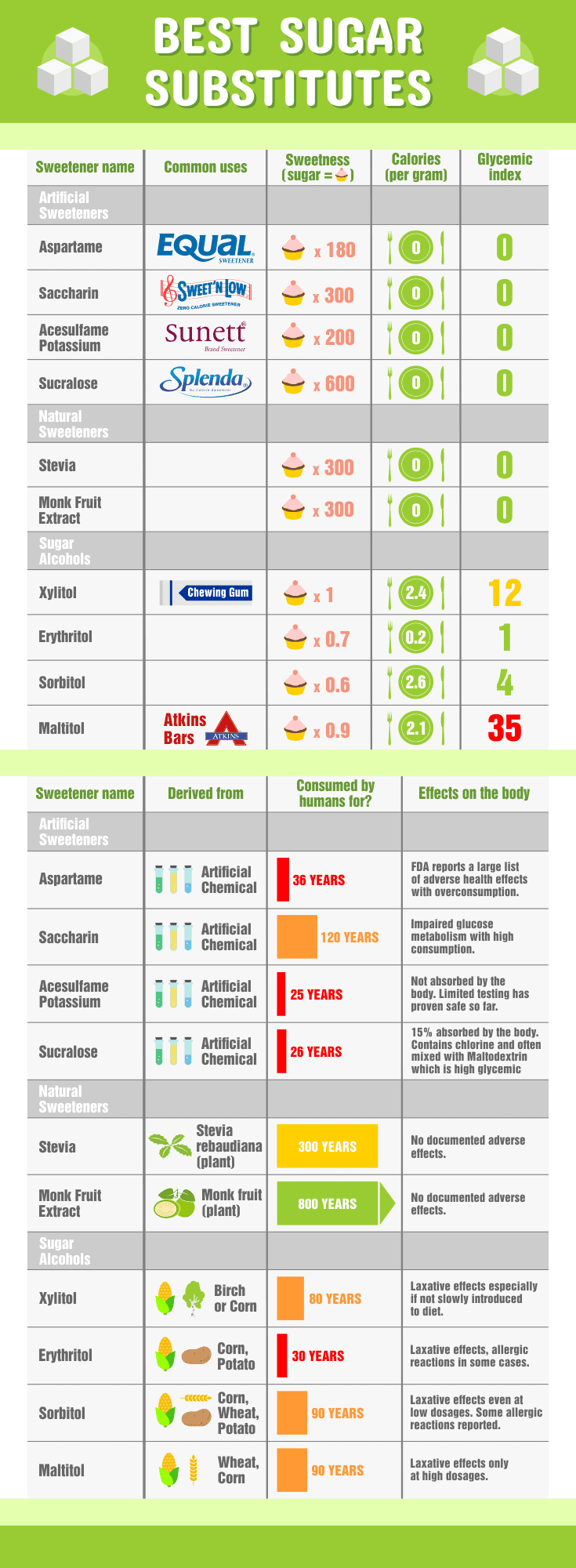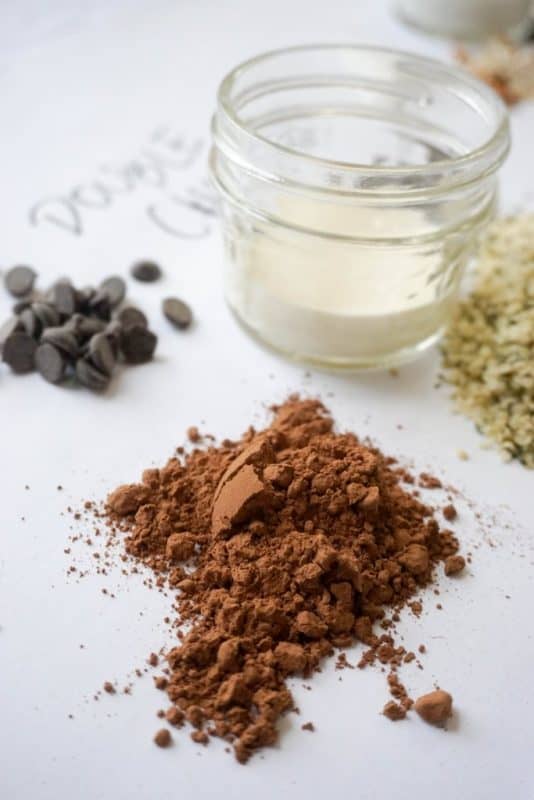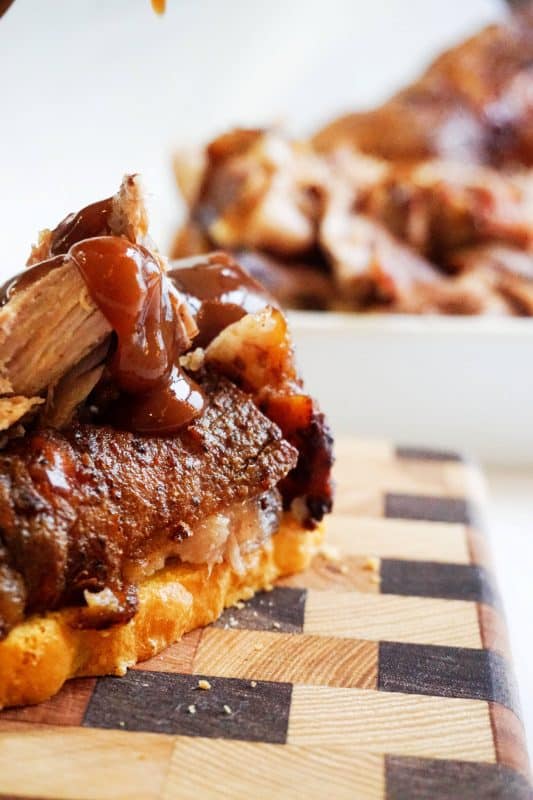We’re going to be breaking these sweeteners down into 3 distinct categories in order to choose the best sugar substitute for a keto diet. Those categories are Artificial Sweeteners, Sugar Alcohols, and Natural Sweeteners. Check out our video where we touch on everything covered in this blog post and give our recommendations for the best sugar substitute for keto.

Artificial Sweeteners
These tend to known as intense sweeteners because they are much sweeter than regular sugar. Based on this fact, you only need a fraction of the amount you would normally use with regular sugar. This is seen as a benefit by many. They contain synthetic chemicals that stimulate the sweet taste receptors on your tongue. So, let us break down the different types of artificial sweetenes.
Aspartame
You might not recognize the name, but if you’ve ever used Equal, you’ve been using aspartame. Aspartame is a low-calorie sweetener, approximately 180 times sweeter than regular sugar. The components that make up this artificial sweetener are amino acid, aspartic acid and phenylalanine, which are not only broken down completely by your body, but found in larger quantities in a great deal of foods, such as meat and vegetables. Aspartame is 0 calories and 0 gylcemic index. When combined with dextrose and maltodextrin to form Equal brand sweetener the calories and glycemic index are increased based on the added ingredients.
Pros:
- Essentially Zero calorie additive
- Zero glycemic index
- Useful for those with diabetic issues/wanting to lose weight
- Approved by FDA
Cons:
- Often mixed with high glycemic bulking agents
- Highest source of complaints to the FDA of any product
- Highly controversial/opposing studies on safety
Acesulfame K
This artificial sweetener is used in a variety of foods and is approximately 200 times sweeter than regular sugar. It is often found in a blend with other sweeteners, such as aspartame. Blending the two helps mask the bitter taste that normally follows when an artificial sweetener is used on its own. What makes this sweetener a zero calorie additive is that it is not broken down by the body. It also differs from its fellow sweeteners based on the fact that it is stable when heated, thus does not lose its sweetness. It is used in many products, such as diet sodas, baked goods, chewing gum, and toothpaste.
Pros:
- Zero calorie additive
- Zero glycemic index
- Useful for those with diabetic issues/wanting to lose weight
- FDA Approved
Cons:
Saccharin
Most commonly available as Sweet N’ Low, seen in pink packets. It is approximately 300-400 times sweeter than regular sugar, but has been known to have a slightly metallic aftertaste. To omit this bitter after taste it is often mixed with other low-calorie sweeteners. It cannot be broken down by the body, thus leaving the body unchanged. Manufacturers are very fond of this sweetener in particular due to its long shelf life. It is used in many diet sodas, low calorie candies, jams, jellies and cookies.
Pros:
- Zero calorie additive
- Zero glycemic index
- Useful for those with diabetic issues/wanting to lose weight
- Does not contribute to tooth decay
- Approved by FDA
- 300-400 times sweeter than sugar
- No known health threats
Cons:
- Not broken down by the body
- Bitter after taste
Sucralose
Used by millions, this sweetener is commonly known as Splenda, found in yellow packaging. Sucralose is approximately 600 times sweeter than regular sugar. Similar to aspartame, people using sucralose have reported issues such as bloating, cramping and rashes, however, not severe. Sucralose is generally calorie free, but Splenda, a sucralose based product, contains the carbs dextrose and maltodextrin bringing the calorie count up to 3.36 calories per gram. However, similar to many other sweeteners, such little is needed making it basically a zero calorie additive.
Pros:
- Zero calorie additive
- Zero glycemic index
- Great for those wanting to lose weight
- Approved by FDA
- 600 times sweeter than sugar
Cons:
- Highly controversial – some studies suggest negative affects on metabolism
- Contains carbohydrates/sugars – maltodextrin and dextrose
- 3.36 calories per gram
- Splenda contains 20% of sugar – not fully suitable for diabetics
- Reported issues of bloating, cramping, and rashes.
Sugar Alcohols
Sugar Alcohols are also seen in a variety of forms and are widely used among ketogenic dieters. The one major caveat to sugar alcohols is that they can cause digestive issues, some more sever than others. Since they can’t be metabolized by your body they end up traveling to your intestine where they can cause symptoms such as diarrhea, bloating, and cramping.
Erythritol
Erythritol is widely known by many as creating a cooling effect in your mouth after consumption. It is on the lower end of calories at .2 calories per gram, and is approximately 65% of the sweetness of regular sugar. This sweetener is heat stable and is a major ingredient in the Truvia sweetener.
Pros:
- Zero calorie additive
- Glycemic index of 1
- Great for those wanting to lose weight
- Heat stable – great for cooking/baking
- 65% sweetness of regular sugar
- Absorbed by blood stream – less likely to cause bloating and cramping
- .2 calories per gram
Cons:
- Not approved by FDA
- May cause mild bloating and cramping
Xylitol
Xylitol is considered natural because it is found in small amounts in many fruits and vegetables. It is most commonly found in chewing gums, mints, diabetic foods and oral healthcare products. Although similar in taste to regular sugar it contains 40% fewer calories, 2.4 calories per gram and has no after taste. Similarly to other sugar alcohols it is not digested and thus poses no negative side effects on your teeth.
Pros:
- Zero calorie additive
- Glycemic index of 10
- Great for those wanting to lose weight
- Does not contribute to tooth decay
Cons:
- Laxative effect
- Not approved by FDA
- Fatal to dogs
- Not digested by body
Malitol
Sometimes referred to as a natural sweetener, it is found in chicory leaves and most popularly in Atkins Bars, but still artificially produced for everyday use. It is most often seen in processed foods as the go-to sugar substitute. Since it absorbs less moisture from the atmosphere it helps keep processed foods moist and can even be found in moisturizers. Given its lack of cooling effect it is highly desirable for ice cream and chocolate products.
Pros:
- Zero calorie additive
- Glycemic index of 35
- Great for those wanting to lose weight
- 90% sweetness of regular sugar
- Does not contribute to tooth decay
Cons:
- Laxative effect, abdominal cramping, and pain
- 2.1 calories per gram
- Not approved by FDA
Sorbitol
Sorbitol is not normally sold on its own but added to food products through manufacturing. It can be found naturally occurring in certain fruits and the body, but is very minimal. It is generally found in chewing gum, hard candies, toothpaste and mouthwash.
Pros:
- Zero calorie additive
- Glycemic index of 4
- Great for those wanting to lose weight
- 55% sweetness of regular sugar
- Does not contribute to tooth decay
Cons:
- Laxative effect, abdominal cramping, and pain
- 2.6 calories per gram
- Not approved by FDA
Isomalto-oligosaccharide (IMO)
IMO is a sugar substitute that can come in fiber syrup form. It is moderately sweet and can occur naturally in foods such as honey, but is normally manufactured for use in baked goods and protein bars. Like many artificial sweeteners, it is resistant to digestion, thus low in calories. However, it is considered a ‘soluble fiber’ because the stomach is unable to break apart the glucose molecules and it passes into the colon without being metabolized. Recent news has brought to light that IMO syrups may not be as calorie free as we think and it is misleading for manufacturers to list the entire carbohydrate content of IMO as dietary fiber.
Pros:
- Glycemic index of 35
- 5o% sweetness of regular sugar
- Adds fiber to your diet
- Approved by FDA
- Adds bulk and texture to foods
Cons:
- Laxative effect
- Manufacturers list entire carbohydrate content of IMO as dietary fiber
- Not entirely broken down by body
Natural Sweeteners
Stevia
Although the stevia we consume on a regular basis is highly processed, combining several sugars, it is actually extracted from the plant Stevia rebaudiana. Its leaves are between 15 and 30 times sweeter than sugar. It can be sold dry, powdered, or concentrated in liquid form.
Pros:
- Zero glycemic index
- 0 calories per gram
- Great for diabetics/wanting to lose weight
- Great for cooking and processed foods
- Liquid or powder form
- No major safety concerns
Cons:
- Bitter aftertaste for some
Monk Fruit:
Monk fruit grows in Southeast Asia and produces monk fruit sweetener, which is used as a natural zero calorie sweetener. The taste of monk fruit extract is preferred by most over stevia, however, it can be very costly to obtain on its own, thus not as widely used.
Pros:
- Entirely natural – extracted from monk fruit
- Zero calories additive
- Zero glycemic index
- 300 times sweeter than regular sugar
- 0 calories per gram
- No major safety concerns
Cons:
- Costly to obtain
The Best Sugar Substitute : Stevia!
There are a variety of options for you to choose from when it comes to using a substitute sweetener in your diet. Some recommendations we would suggest would be to remain cautious of using them in large quantities. Many can have negative side effects while some side effects are still unknown in relation to long term use. It is important to gauge your body’s reactions and how you adjust when you introduce a new substitute sweetener. If you do notice certain negative side effects, it’s likely best to dial back on its use.
Something to take note of is how consuming these substitute sweeteners can affect your cravings. They have been known to increase cravings for sweets, therefore, moderation is key. Given the research and studies that have been conducted surrounding all substitute sweeteners regarding calories per gram, sweetness, impact on blood sugar level, taste and use in cooking and baking, Stevia comes out on top as the best substitute sweetener. If it weren’t for monk fruits substantial cost, we would regard monk fruit as the best substitute sweetener. It is likely, however, that we will see monk fruit emerge more and more in its use throughout foods in the upcoming years.
We go through all of the information discussed in this blog post in the following video. We also give some insight into what sugar substitutes we use on a daily basis in our cooking and baking.
In Summary
The best combination of sweeteners for a ketogenic diet are stevia and erythritol. Stevia is a concentrated liquid sweetener which is used in small amounts to add lots of sweetness to recipes. Erythritol is a granular sweetener which can be used in place of sugar to add bulk and sweetness to recipes.
Written by
Matt Gaedke
Matt is a former college basketball player turned computer engineer who discovered his passion for health and nutrition after cutting sugar from his diet in 2016. That year he founded KetoConnect with Megha in order to share their ketogenic lifestyle through recipes, videos, and educational content. Matt is always seeking to grow and try new things, a passion he shares with his wife and two amazing sons.

